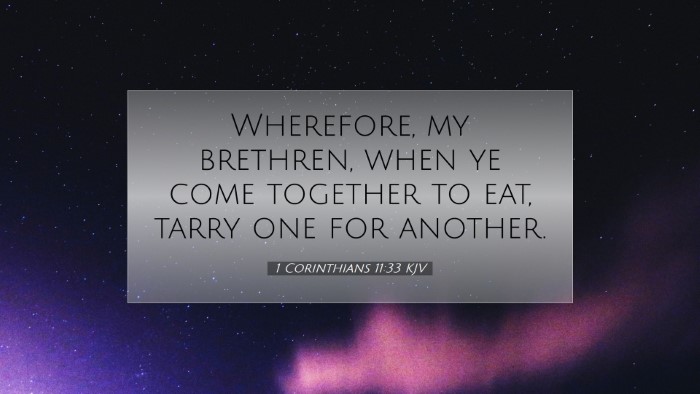Commentary on 1 Corinthians 11:33
The verse under consideration, 1 Corinthians 11:33, reads as follows: "Wherefore, my brethren, when ye come together to eat, tarry one for another." This scripture encapsulates important themes regarding community, the sacredness of fellowship, and the principles of love and respect among believers during the observance of the Lord’s Supper.
Contextual Analysis
To appreciate the depth of this verse, it is critical to place it in context. The Apostle Paul is addressing the Corinthian church, which was grappling with various issues related to disorder, divisions, and misunderstandings about spiritual practices. The immediate context of this verse is the instructions surrounding the Lord’s Supper, where unity and mutual respect are imperative.
Insights from Public Domain Commentaries
Matthew Henry
Matthew Henry emphasizes the significance of the communion meal as a means of fostering unity among believers. He notes:
- The phrase “tarry one for another” indicates a profound call for mutual consideration and hospitality within the church community.
- Henry suggests that the practice of waiting for one another reflects the essence of Christian love and selflessness, as each participant should regard their brother’s needs as paramount.
Albert Barnes
Albert Barnes interprets this verse as an exhortation to exhibit patience and thoughtfulness in communal gatherings:
- He remarks that when coming together for the Lord’s Supper, believers are urged to ensure that they partake in a manner that uplifts each individual, enhancing the communal experience.
- Barnes further illustrates that the neglect of this principle could lead to divisions and discord, an unfortunate reality evident in the Corinthian church.
Adam Clarke
Adam Clarke offers a detailed interpretation, highlighting the cultural backdrop of Corinth. He notes:
- Clarke argues that the various social standings among the members of the Corinthian church created an environment where some felt superior, leading them to rush ahead in the meal.
- He urges that Paul’s message is clear; members ought to wait for one another, ensuring that the love of Christ permeates their interactions and honors the communal aspect of the meal.
Theological Implications
The theological implications of 1 Corinthians 11:33 should resonate powerfully with pastors and theologians:
- The Principle of Unity: The verse underlines the necessity of unity in the body of Christ, which aligns with other scriptural teachings advocating for love and harmony among believers (Ephesians 4:3).
- The Role of Community: It highlights the church not merely as a gathering of individuals but as a cohesive body where every member is valued, a theme Paul articulates throughout his letters.
- Impact on Worship Practices: The command to ‘tarry for one another’ influences contemporary worship practice and church gatherings, urging unity and cooperative participation.
Practical Applications
In light of these insights, several practical applications arise for today’s church:
- Encouragement of Inclusivity: Churches must create an environment where everyone feels included, especially in communal worship and fellowship.
- Promotion of Patience and Love: Believers are encouraged to embody patience and love, ensuring that no one’s needs are overlooked.
- Collective Reflection: Church leaders may foster occasions for reflective worship that emphasizes the importance of being attentive to one another's spiritual and physical needs.
Conclusion
In conclusion, 1 Corinthians 11:33 serves as a powerful reminder of the responsibilities that believers hold towards each other. The call to "tarry one for another" encourages a spirit of community, love, and mutual respect. By integrating the wisdom from public domain commentaries, we gain a deeper understanding of the text and its application to our lives and churches today.


